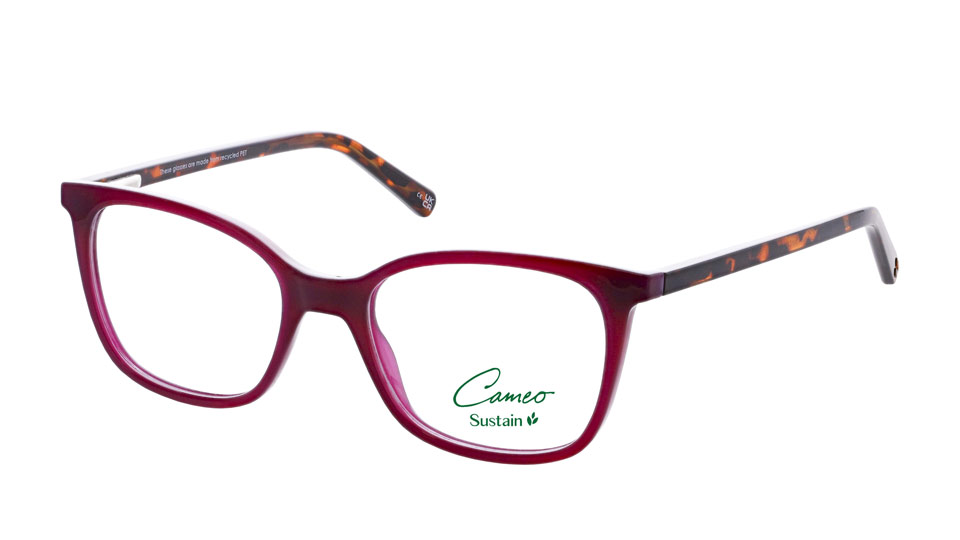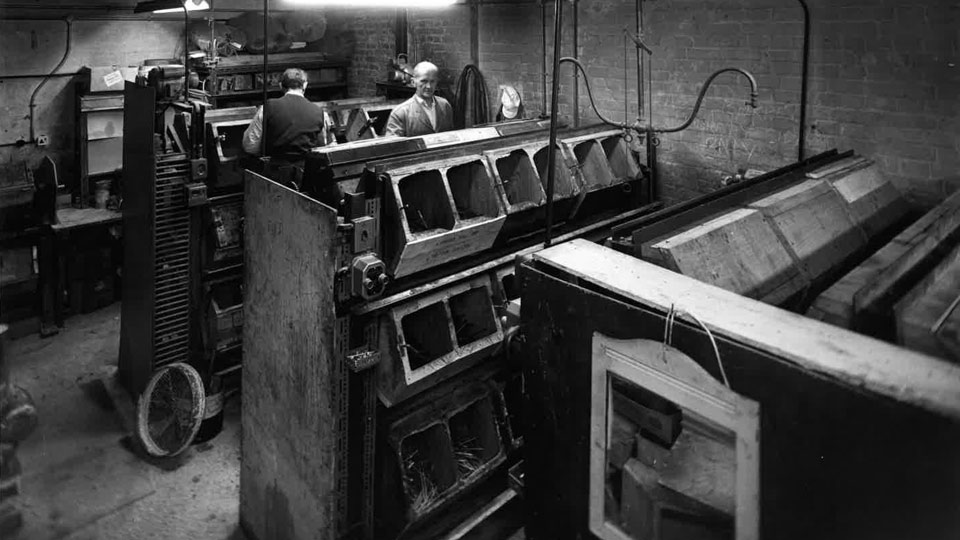- OT
- Industry
- Eyewear and lenses
- “It is a big milestone”
Behind the brand
“It is a big milestone”
James Conway, CEO of Millmead Optical Group, on the company’s 75th anniversary, sustainable ambitions, and upcoming launches

05 December 2021
Could you tell us about Millmead’s sustainable ambitions?
It has been a huge project. Just a few of the changes we have made include LED lighting, recycling our waste and changing our packaging. It's ongoing indefinitely – that’s the way to think about sustainability. When I started to consider sustainability five or six years ago, I thought that you just do X, Y and Z. What I’ve realised is that the whole point is just to keep on going and keep questioning everything you do.
I think people worry that everything is going to cost more money, so they are almost afraid to start looking at sustainability: “What if I open Pandora’s box?” There are of course things that cost more, but a lot of it is incremental. It’s just making a decision to move in that direction and find the ways you can do it that work for your business. There isn’t a black and white solution to this.
It's ongoing indefinitely – that’s the way to think about sustainability
What makes eyewear from the Millmead Optical Group unique? How does the upcoming Cameo Sustain collection stand out?
We make our own frames, lenses, cases and accessories. For our frames we have our own design team in the UK, so all our products are unique.
The Cameo Sustain range of frames is launching in January at 100% Optical and is entirely made from recycled plastic bottles (recycled-PET). When we talk about environmentally-friendly products, a lot of the time, you’re still creating a new material, but what we tried to do was to take some material that was already there and make it into something else.
A problem historically with using recycled-PET was that you were limited on the finishes. We’ve found a way that means we can have both shiny and matte frames. This was more technically difficult to develop and has taken a little longer. The demo lenses in these frames are also made from recycled plastics. We’ve got even more developments in our sustainable eyewear range coming around May or June next year.

Millmead Optical Group in three interesting facts
- The company started in 1946 and originally made frame sides. Conway’s grandfather patented the PIMO machine that could insert a metal core into acetate frames. This made the process much more efficient and the approach is still used in many places today
- In October, Millmead launched a range of cases created from a material sourced from recycled plastic bottles and made in the UK
- Millmead Optical Group aims to offer a ‘one-stop-shop’ service, providing frames, lenses, cases and accessories, decreasing costs and the environmental impact from a reduced number of shipments.
What is the latest product you have launched? What is the company working on next?
In October, Optoplast revealed a range of sustainable cases made in Liverpool. It is amazing to see them made in the UK again – it is what we used to do in the 1980s and so it has come full circle.
On the lenses side, we will be launching a few things at 100% Optical. There are two projects we have been working towards in lenses. The sustainability of everything we do with lenses, such as the packaging and the way they are shipped, has been a large project. All lenses are supplied in soft envelopes. We found that if these are laminated, it can’t be recycled, so across the business we have moved towards using unlaminated paper.
The other project has been lens waste. All the waste from edged and surfaced lenses goes to landfill or is incinerated. That is a huge problem that nobody talks about. It’s a difficult problem to solve, but something we hope to have a solution to in early 2022.
One of the products we’re going to be launching in 2022 is our patented Saniteyes range, where the structure of the frame is specially treated to be antiviral and antibacterial. Once a virus comes in to contact with the frame surface it is killed off. It's not a coating, so even if you scratch the surface, it is embedded in the frame structure. I don't think anybody's done anything like that before and, certainly for some older patients, that's going to be a real game changer.
What are the company’s main ambitions for the next 12 months?
I think the consolidation of the supply chain in terms of having a one-stop shop, where we can deliver everything to a retailer and reduce deliveries, will be a focus. We supply frames, lenses, cases and accessories, but there are others supplying contact lenses, solutions, store fittings and papers. Perhaps if we could partner alongside some of the other suppliers and get down the number of deliveries to each store every day it would be more cost effective for everybody and better for the environment. It would be nice to find a way to work more collaboratively on that.
What does it mean for Millmead to be celebrating its 75th anniversary milestone?
It is a big milestone. It’s been a bumpy ride at times. I’ve only been involved for 22 years and my memories as a kid are that it was a very different business back then. Much smaller and fewer employees, but a reasonably successful business. We had a really interesting product when we started with the PIMO machine in 1945 and the business went through so many transitions of ownership over the years. It is nice that its back in the ownership of the two families who founded it.
The staff have been incredible. The chief operating officer is only 47 and he celebrated his 30-year-anniversary with us this year. He’s not the only one. We’ve been very fortunate that we have staff who feel very passionate about what we do.
It is wonderful to be bringing manufacturing back to the UK with the cases. I wouldn’t rule out more frames in the future. We have the Walter & Herbert range, which we make in the UK and is made from acetate. If we were going to further expand the production in the UK we would need a lot more machinery so it would be a huge commitment. We’re looking at that but it wouldn’t be something we did until 2023 or 2024.
Memories from the tumbling room

Image: The tumbling room where Optoplast originally started making temples based in Millmead, Guildford in the 1960s.
How did COVID-19 affect the business? How did Millmead adapt?
It was devastating when COVID-19 first hit because everything just stopped. The initial priority was the safety of our staff. We had some important ongoing optical requirements for people who needed things for emergencies and which we didn’t want to shut down. We had to make sure that everybody was spaced out, fully equipped with personal protective equipment, doing COVID-19 tests, disinfecting and washing hands all the time. It was very complicated but we found a way to sustain that working practice for several months.
It was a really tough March, April, May and June in 2020. But everyone pulled together. It is amazing when you have a situation like this; there’s no rulebook, you just have to take it every hour, day-by-day, and the support from the team was unbelievable. Everyone was so committed to navigating through the problems.
In July, when practices were allowed to open again, fortunately the demand grew quite quickly and we were able to bring more people back from furlough. Some practices still don’t want business development teams coming into stores at the moment so we’re providing more online communication, videos and campaigns.
What the past 18 months has done is given us time to reflect on the business. I’d rather not have gone through it, but we have to make the best of a bad situation. It gave us time to develop some other ideas; we've got another new range of eyewear launching at 100% Optical that we've developed during this period of COVID-19 and that we would not have done otherwise.
Sustainable steps
Incremental change
We nominated someone to be a recycling champion and it has been absolutely brilliant to have someone whose job is to work through all of the legislation, developing plans and overseeing our environmental credentials and certifications.As a business we recycle as much as we can and use Forest Stewardship Council (FSC)-certified paper. [The FSC system enables businesses to purchase wood and paper products while ensuring they are made from well-managed forests or recycled sources]. We’re also using different packaging solutions, consolidating deliveries, and incentivising our sales teams to use hybrid or electric cars.
One example of a change we made is that a staff member pointed out how bad it was that we walked around with plastic bottles every day, so we brought everyone metal water bottles – with each bottle purchased also supporting a company to plant trees in mangroves and rainforests.
Certifications
We are a member of the International Sustainability & Carbon Certification (ISCC) and so work to the ISCC policies and good management practices. We also have the Global Recycled Standard certification, which is a third-party verification for the recycled-PET and materials we use.There are three other big accreditations we are working on. The Carbon Trust certification involves a long-term offsetting challenge because our business generates a carbon footprint and we’re looking at ways we can reduce and offset that.
The B Corp Certification and ISO 14001 are slightly more difficult to get, and I think will be pioneering. We think we’ve met the criteria and we’re hoping to gain the certifications in the next three to seven months.
Advertisement


Comments (0)
You must be logged in to join the discussion. Log in